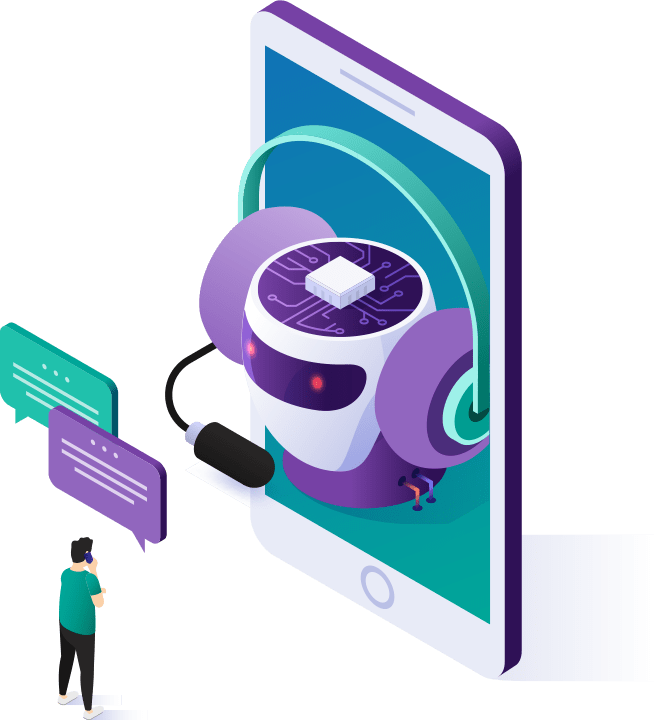Automate More with Contact Center AI
Various cutting-edge technologies are available to assist contact centers in serving more customers with higher levels of customer satisfaction than ever before.

Automate routine tasks without compromising customer experience
Give your customers the experience they deserve quickly, simply, and without having to press any buttons. IVR automation tools can provide:
- Enhanced Customer Service: Say goodbye to impersonal IVR menus. Allow your customers to interact with intelligent virtual agents that provide natural and human-like conversations.
- 24/7 Availability: Never miss a customer call, even after hours. Our virtual agents are always on, providing round-the-clock support, and freeing up your human agents to focus on more complex tasks.
- Efficiency and Cost Savings: Reduce operational costs by automating routine tasks and inquiries. Our virtual agents handle repetitive queries, leaving your live agents to tackle higher-value interactions.
- Data-Driven Insights: Gain valuable insights into customer behavior and preferences with SmartAction’s analytics. Use this data to make informed decisions, personalize customer interactions, and optimize your processes.
- Seamless Transition: Transitioning from traditional IVR to our virtual agents is a breeze. Our technology integrates effortlessly with your existing systems, ensuring a smooth and painless migration.

Contact Center Automation Tools
Contact center automation tools have become increasingly popular as businesses strive to streamline operations and enhance the customer experience. These solutions can enable organizations to manage inbound and outbound communications across multiple channels, such as phone calls, emails, live chat, and social media.
By automating repetitive tasks and using artificial intelligence (AI) technology to assist agents in their work, contact center automation tools can significantly improve efficiency while maintaining high levels of customer satisfaction.
One often essential type of contact center automation tool is call center tools, which are designed to support the various functions performed by call centers. These tools typically include features like automatic call distribution (ACD), interactive voice response (IVR), predictive dialing, and workforce management software.
- ACD systems intelligently route incoming calls to the most suitable agent based on predefined rules or algorithms, maximizing call handling efficiency.
- IVR systems automate common customer interactions by allowing callers to interact with a computerized menu using their voice or touch-tone keypad.
- Predictive dialers automatically place outbound calls from a list of numbers, connecting agents only when a live person answers the phone.
- Workforce management software helps contact centers optimize staffing levels by forecasting call volumes and scheduling agents accordingly.
Another crucial development in contact center technology is the emergence of virtual call centers. Virtual call centers leverage cloud-based solutions that enable businesses to deploy their customer support infrastructure remotely rather than relying on a centralized physical location.
This approach offers several potential advantages over traditional brick-and-mortar facilities, including cost savings due to reduced overhead expenses and increased scalability as companies can quickly add or remove agents without needing additional office space or hardware. Moreover, virtual call centers allow organizations to access talent from around the world, ensuring optimal language capabilities and specialized expertise when needed.
Contact center automation has also seen significant advancements in recent years with conversational AI IVR systems becoming more prevalent. These sophisticated AI-driven platforms use natural language processing and machine learning algorithms to understand human speech patterns better than traditional IVR systems. As a result, they are often capable of handling more complex customer inquiries and providing personalized responses that cater to the individual caller’s needs.
By automating more aspects of the conversation, conversational AI IVR systems can reduce the need for human intervention, allowing contact center agents to focus on higher-value tasks that require human empathy and problem-solving skills.
Contact Center Automation Use Cases
Contact center automation use cases are becoming increasingly prominent as businesses seek to streamline their customer service operations and deliver enhanced experiences to their clientele. This rapid growth in contact center automation may be driven by the integration of cutting-edge technologies such as artificial intelligence (AI), conversational AI, and advanced interactive voice response (IVR) systems.
One noteworthy development in call center automation AI is its ability to automate routine tasks and interactions that typically require human intervention. By doing so, AI-powered solutions help reduce wait times for customers, improve first-call resolution rates, and enable agents to focus on more complex issues that demand human oversight.
Examples of automatable tasks include ticket creation, routing calls to appropriate departments, and providing instant answers through chatbots or self-service portals. Exploring various contact center use cases reveals a wide array of applications for these advanced technologies. For instance, conversational AI can be employed to tackle frequently asked questions through natural language processing (NLP), enabling customers to interact with the system using their everyday language. Additionally, it can assist in gathering initial customer information before transferring the call to a live agent—potentially improving overall efficiency and productivity.
Moreover, when examining conversational AI use cases within contact centers, one cannot overlook the ongoing debate between IVR vs IVA (interactive voice assistant) systems. Traditional IVRs rely on touch-tone or simple speech recognition technology for customer input; however, they often fail to understand complex queries or provide personalized experiences. On the other hand, IVAs leverage NLP capabilities along with machine learning algorithms to better comprehend customer intent and generate contextually relevant responses.
Conversational AI
Conversational AI, a sophisticated technology that enables human-like interactions between machines and humans, has become quite popular. By harnessing the power of natural language processing, machine learning algorithms, and cognitive computing, conversational AI can often decipher and respond to user inputs in a way that closely mirrors human conversation.
The question “what is conversational AI” often arises as more businesses and individuals begin to embrace this cutting-edge technology. In simple terms, conversational AI refers to the use of artificial intelligence to create natural, intuitive conversations with computers. This innovative approach allows users to interact with digital systems using everyday language instead of relying on traditional methods such as typing or clicking buttons.
A key type of conversational AI is the “conversational AI bot,” which consists of a computer program designed to simulate intelligent conversation with users. These bots are often capable of understanding complex language patterns and providing contextually relevant responses based on their programming and learned experiences.
As a result, they can very often provide an engaging user experience that mimics talking with another person. Conversational AI bots have seen remarkable success in fields such as customer support, eCommerce assistance, virtual assistants for professionals, and even companionship for people in need.
Another important aspect of conversational AI is the development of “conversational AI agents.” These agents serve as intermediaries between the users and various digital services or applications. Their primary role often involves extracting meaning from user inputs and translating them into actions that deliver the desired results seamlessly.
Some common examples include personal assistants like Siri or Alexa, customer service chatbots for online retailers or airlines, and virtual tutors for educational institutions.
Contact Center Virtual Agents
Contact center virtual agents have become an essential component of modern customer support and service solutions. These virtual agents, powered by cutting-edge technologies such as artificial intelligence (AI) and natural language processing (NLP), are capable of understanding complex user queries and providing accurate, timely assistance to customers across various channels.
One distinct advantage of contact center virtual agents is their ability to offer superior conversational IVR (Interactive Voice Response) experiences. Conversational IVR empowers customers to engage with a company’s support system using natural language, either through voice or text-based interactions. This significantly enhances customer satisfaction as it eliminates the need for users to navigate cumbersome menu options or wait on hold for a live agent.
When it comes to implementing contact center solutions, businesses must carefully assess their requirements and consider incorporating virtual agents into their processes. Virtual agents can handle repetitive tasks efficiently, freeing up human agents to focus on more complex issues that require empathy and critical thinking skills.
Moreover, these digital assistants can be available around the clock, ensuring that customers receive immediate assistance irrespective of the time or day. In essence, the use of contact center virtual agents has revolutionized customer support operations by enabling businesses to provide prompt, personalized assistance without compromising on quality or efficiency. By leveraging advanced technologies such as AI-powered conversational IVR systems, companies can often enhance their customers’ experience while reducing operational costs.
As customer expectations continue to evolve rapidly in today’s digital age, integrating virtual agent technology into contact center solutions has become a strategic necessity for many businesses striving for competitive excellence in the market landscape.
Contact Center Automation Trends
The dawn of the digital age has revolutionized the contact center industry with new and innovative trends. Contact center automation trends have become a focal point for organizations as they seek to improve efficiency, streamline operations, and deliver exceptional customer experiences.
The rapid development in artificial intelligence (AI) technology, alongside other cutting-edge advancements, is making call center automation a reality and driving call center innovation ideas. One prominent trend in the contact center space is the implementation of AI-powered solutions. Call center automation AI tools have drastically improved the way businesses handle customer interactions, reducing response times, and enhancing agent productivity.
Many companies are now adopting AI chatbots to address routine queries from customers while allowing human agents to handle more complex issues that require personalized attention. Another influential trend is the rise of omnichannel communication in contact centers. This approach empowers businesses to provide seamless communication across various channels such as phone calls, emails, social media platforms, and live chats.
Integrating these channels into one unified platform enables organizations to maintain consistency in their customer interactions and improve overall service quality. Innovative ideas are also emerging to make call centers more efficient by leveraging advanced analytics capabilities.
By monitoring key performance indicators (KPIs), businesses can gain valuable insights into agent performance and customer satisfaction levels. These data-driven insights enable organizations to implement targeted measures for continuous improvement in their contact center operations.
As technology continues to advance at breakneck speed, the adoption of sophisticated call center technology may become increasingly vital for organizations aiming to stay ahead of the curve. In particular, cloud-based platforms offer businesses scalability and flexibility by migrating their contact centers to virtual environments.
Automated Call Center Software
The realm of customer service has shifted significantly with the advent of automated call center software, a technology that aims to improve efficiency, accuracy, and overall satisfaction in contact centers. This innovative solution has enabled many organizations to effectively and seamlessly manage their customer interactions while reducing operational costs and enhancing the user experience.
One of the key features of this technology is the integration of Artificial Intelligence (AI) for contact centers. AI-powered algorithms analyze vast amounts of data and provide real-time insights to agents during interactions with customers. This helps them make informed decisions on how best to address their concerns and queries. Additionally, AI-enabled chatbots handle routine inquiries while enabling agents to focus on more complex issues that require human intervention.
Contact center software also encompasses various call center solutions designed specifically for seamless communication between businesses and their clientele. These include omnichannel support options such as voice calling, email, live chat, social media messaging, and even video conferencing.
By offering customers numerous channels through which they can reach out for assistance or information, companies can cater to diverse preferences while ensuring that inquiries are promptly addressed. Furthermore, automated call center software often incorporates features such as intelligent call routing and workforce management tools. These help ensure that incoming calls are directed to the most suitable agent based on factors like skill set, language proficiency, or availability. Workforce management tools enable supervisors to monitor agent performance in real-time as well as plan staffing levels effectively by analyzing historical data trends.
Another notable advantage of employing AI for contact centers lies in its ability to track customer sentiment throughout interactions. By evaluating the tone and choice of words used by clients during conversations with agents, AI-powered systems can gauge customer satisfaction levels and suggest appropriate actions for resolving grievances or identifying upsell opportunities.
How Can SmartAction Help?
SmartAction can help your organization automate routine customer contact types so that your agents can focus on more complex tasks that require more empathy or specialization. This helps your customers serve themselves efficiently and your contact center agents prevent burnout.
Find out how we can help your specific business by scheduling a consultation below.

